Support strong Canadian climate journalism for 2025
In Canada, charging an electric vehicle at home can save big bucks compared to buying gasoline. How much, you ask? Take a look.
My chart below compares the cost of fueling a vehicle with gasoline at the pump vs an equivalent amount of home electricity in major cities across Canada.
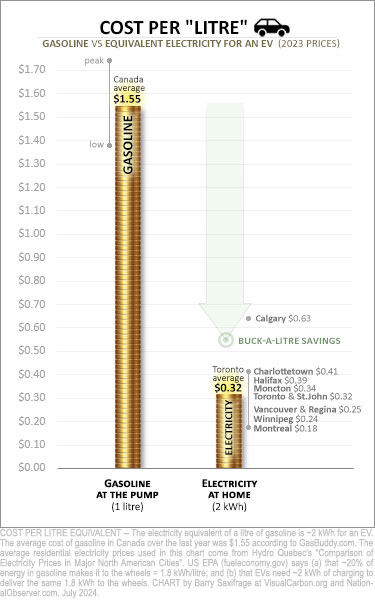
The tall stack of coins shows the average cost of a litre of gasoline in Canada. That’s been around $1.55 per litre over the last year (GasBuddy data).
To drive the same distance, an electric vehicle needs an average of roughly two kilowatt-hours (kWh).
In Toronto, charging that much at home costs an EV driver around $0.32. That is shown by the tiny stack of coins on the chart.
As the chart also shows, EV drivers can charge at home for even less in Vancouver, Regina, and Winnipeg — around $0.25 (residential rates: ~$0.12/kWh). And in Montreal, EV drivers charging at home pay as little as $0.18 for the equivalent of a litre of gasoline (residential rates: ~$0.09/kWh).
The residential electricity prices I’m using in this article are published by Hydro Quebec in their annual survey: “Comparison of Electricity Prices in Major North American Cities”. The survey includes one major city in each province, all of which I’ve shown on the chart. As you can see, EV drivers in nearly all these cities can save more than a buck-a-litre-equivalent by charging at home. The one outlier city is Calgary which seems to be dealing with unusually high electricity prices during the last year. But even in Calgary, EV drivers who charge at home pay less than half of what they would pay for gasoline.
Saving a dollar per litre can add up to huge savings over the lifespan of a typical car. For example, the average new gasoline-burning car in Canada requires 8.3 litres per 100 kilometers. Over the average lifespan of 320,000 kilometers (200,000 miles) the driver needs to buy more than 25,000 litres of gasoline. Double that — 50,000 litres! — for drivers of many large gasoline burning SUVs and pickup trucks requiring 16 litres or more per 100 kilometers. Charging a similar electric SUV or truck at home can save thousands of dollars compared to buying gasoline.
Why are EVs so much cheaper to fuel?
Electric vehicles are so much cheaper to fuel because they require so much less energy to move around. That’s according to the U.S. Environmental Protection Agency (EPA). My next chart tells the story.
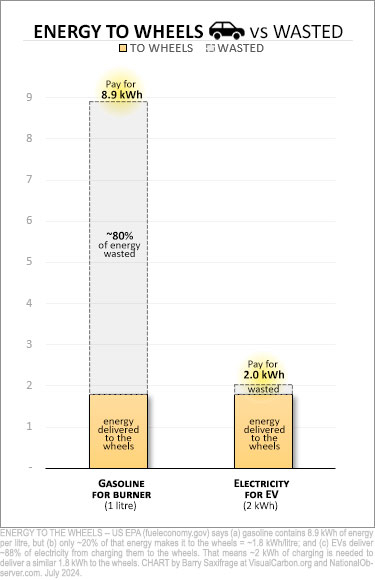
The EPA says gasoline contains 8.9 kWh of energy — but roughly 80 per cent of that energy gets lost as waste heat and friction. Only around 20 per cent of the gasoline energy that drivers pay for ends up turning the wheels. That’s shown on the chart’s tall bar.
In contrast, the EPA says EVs lose only around 12 per cent of the electricity put into them – leaving around 88 per cent of the energy an EV driver pays for to power the wheels. That’s shown on the chart’s smaller bar.
The two bars on the chart show that to deliver the same amount of energy to the wheels, gasoline vehicles require four times more energy put into them than EVs do. And buying four times more energy is a lot more expensive.
So, let’s all take a minute to pity the Canadians stuck buying gasoline. Just imagine how ripped off you'd feel if you had to buy four times more than you used of any other consumer product. Would you be happy buying beer from a company when three-out-of-four cans were always empty? Or how about ordering pizza from a company that charged you for a full pie but delivered only a couple slices sliding around inside a big empty box? I’d shop somewhere else if I could.
That’s essentially what happens to Canadians every day at the gas pump. They pay for four times more energy than they use. And all that wasted energy gets dumped out the tailpipe — along with a dangerous spew of noxious chemicals and generational climate havoc.
Fortunately, Canadians now have lots of good electric vehicle alternatives to choose from. These EVs run on our very own made-in-Canada electricity, which is a much cheaper, cleaner and safer way to power our cars and trucks.
Away from home: free to fast charging
I’ve focused on charging at home, because that is the easiest and most predictable option. The price is known and it's a lot cheaper than gasoline. As a bonus, drivers charging at home with the most common home charger (level 2) can start each morning with a full tank.
However, some people can’t charge at home at all. And most EV drivers will need to charge away from home at some point. So, I’ll wrap up with a very brief discussion of the cost of charging an EV away from home.
Our family has been driving an EV for more than a decade now. We are a one-car family, and our car is a full battery electric vehicle. Over the years we’ve enjoyed many long road trips of 4,000+ kilometers in it. So, we’ve got a lot of experience charging away from home.
In terms of cost, charging on the road can range from totally free to almost as expensive as gasoline.
On the free side, many towns and businesses provide free charging while you shop or stay there. One particularly large network of free chargers is Tesla’s 40,000+ destination chargers, located at restaurants and hotels around the world. We’ve often stayed at a hotel or motel that offers free charging so we could charge up while we slept and head out with a full battery.
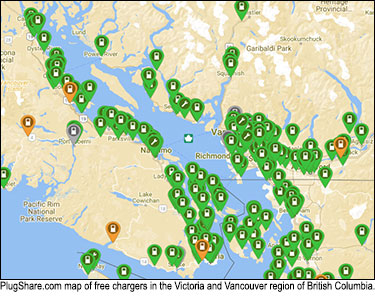
A good way to find free charging sites wherever you are is to use a website like PlugShare. These sites usually allow you to filter their map to show only the free charging sites, if you want. Most of these free chargers are “level 2” which slowly charge your car over hours.
Fast chargers can recharge your car in minutes instead of hours. But these are rarely free and they usually cost significantly more than charging at home.
For example, the largest network of fast chargers in the Vancouver area is the Tesla Supercharger network. The cost at these currently ranges from $0.17 to $0.50 per kilowatt-hour depending on location and time of day. Their app lists the price schedule for different times of day at all their superchargers, so drivers can pick and choose the cheapest locations and times.
If you are at a charger, like these, that tells you how much you are being charged per kilowatt-hour then you can easily compare it to the cost of gasoline by using the same rough rule of thumb mentioned above: two kilowatt-hours = one litre of gasoline. For example, if you are paying $0.30 per kilowatt-hour at a fast charger, then that is roughly equivalent to buying gasoline at around $0.60 a litre.
Frustratingly, many chargers in Canada are priced by the minute – not by how much energy you get. That can make it nearly impossible to figure out ahead of time how much you will pay per kilowatt-hour. Imagine a gasoline pump that charged you by the minute without telling you how many litres they would pump into your car during that time. So, buyer beware.
One last calculation I often do in my head as I drive past a gas station is to convert the gasoline price shown to the equivalent cost of charging an EV. Using the same rule of thumb — two kilowatt-hours = one litre of gasoline — means I just need to cut the gasoline price in half. For example, a Vancouver gas station the other day listed $1.80 per litre. That’s the equivalent of paying around $0.90 per kilowatt-hour to charge an EV.
Complaining about the high cost of gasoline is common in Canada. Rather than paying and complaining, hundreds of thousands of Canadians have switched to battery electric vehicles — and are skipping the gas pump altogether. With such huge fuel savings on offer, it's not surprising that more and more Canadians are making the switch every day.

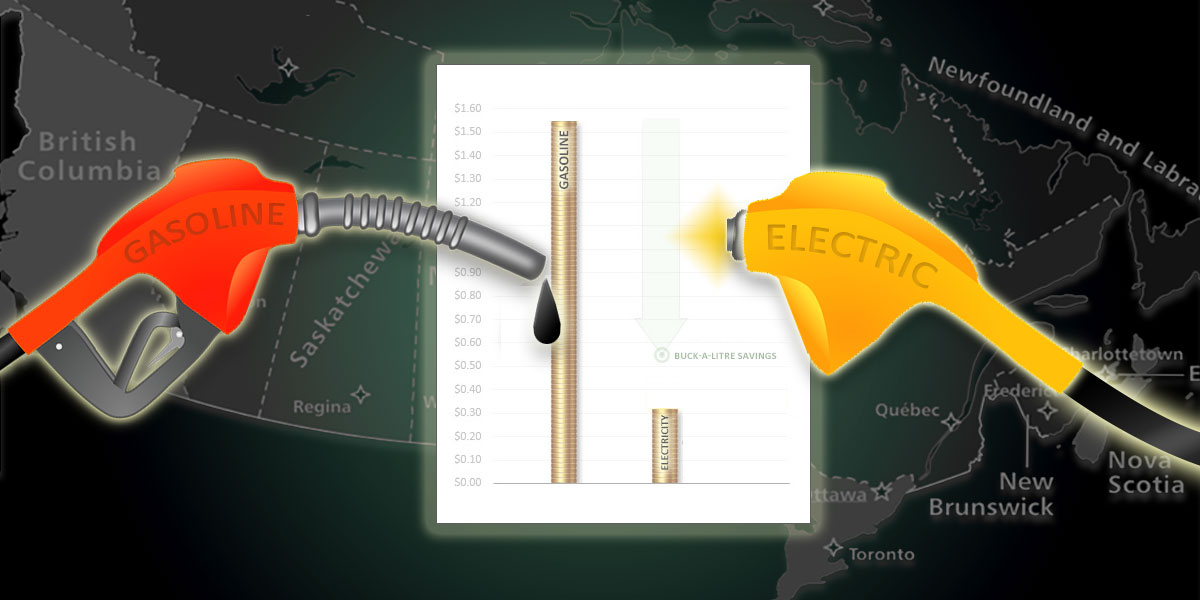

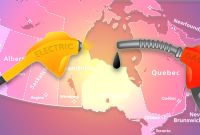

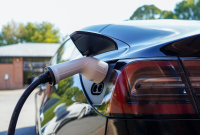
Comments
You are not really counting the real cost or emissions - just a blinkered North American notion of monetary cost per litre. Every tonne of mined lithium results in 15 tonnes of CO2 emissions in the environment. In addition, it is estimated that about 500,000 litres of water are needed to mine approximately 2.2 million litres per tonne of lithium. This substantially impacts the environment, leading to water scarcity in already arid regions. Mining, if you count all the cost, is not going to save the world from climate change, while it is going to compound the ecological and biodiversity crises we have already made.
Oh give me a break. First, that's not what the article is about. Second, your thesis is bankrupt on a number of levels.
Level 1: Talking about the environmental cost of mining lithium, while ignoring the environmental cost of mining crude oil. In the former case, you fill up your car with a battery once every ten years or something, and the battery probably gets recycled or reused after that. In the latter case, you fill up your car with gasoline every few days. Which requires more mining? Duh. Talk to me about how much water they use in the tar sands, or how much CO2 is generated in the refining process.
More broadly, while an electrified economy will not SOLVE our overall ecological and biodiversity crises, it will on balance clearly make them less bad--the massive increased efficiency in energy use (as noted in the article--20% with gas, 88% with electric motor), the shift away from mining stuff in order to burn it, the reduced air pollution (I expect humans aren't the only ones that can get respiratory illnesses etc), and the less damaging infrastructure (wires vs pipelines, refineries, gas stations, tankers, trucks etc) will all somewhat reduce environmental damage for a given level of economic activity. Growth will still ultimately swamp that, but that's a problem that has nothing to do with EVs per se.
Level 2: There are lots of battery technologies, so talking about lithium is misleading. Sodium batteries are spreading, for instance, and getting your hands on table salt is not difficult.
Level 3: Talking about how much CO2 gets emitted by industrial and mining processes is accurate, if worthless, today, but the very act of spreading EV use and other energy transition measures makes it less and less accurate over time. As more mining vehicles, transport vehicles and industrial processes involved in mining, transporting and refining that lithium get electrified, less and less CO2 will be generated by the process. But not JUST by the process of mining lithium--by ALL those processes, the ones driving the whole industrial economy, which do not go away because you want to be perfect and pure. Bitching about this is the definition of penny wise, pound foolish. Not to mention shortsighted. By avoiding EVs, you avoid a relatively tiny amount of CO2 in order to block the shift to avoiding ALL the CO2. It's incredibly stupid.
Overall, the one not counting the real cost or emissions is you.
Good rebuttal.
Thank you Rufus. I second every thing you said. All true and to the point. We really need to get people out of cars, but if we are to have cars they should be electric. I have a 2005 Civic coupe that is very frugal on gas. I hope to make it my last ICE car.
Recycling used batteries is becoming big business. The more you recycle a material, like lithium, the less demand there is on new material, and therein less demand on mining.
Critics of critical mineral mining have never addressed closed loop materials cycles or have done any research on the peak of car demand and its causes, namely the advent of mass transit in big Asian and European cities. (Neuman Kenworthy, 2015).
The rate of demand decreases in car ownership remains slow. The reasons for that are varied, from the high initial cost and long construction timelines of public transit projects to people's ingrained emotional response to the conveniences of personal transport without looking at the personal and social costs. The result is a slow transition away from car dependency.
This is why EVs are important. They offer an immediate replacement of fossil fuels (except those minimal amounts by comparison used in manufacturing) and very generous operating cost savings, well documented by Barry Saxifrage as usual.
Personally, I prefer living in a walkable community. But I certainly see a role for EVs as petroleum replacement devices, as catalysts for the absolutely required electrification of everything, and as clean power storage units that, when linked together to the grid and two-way metering, offer grid-scale distributed power storage and net savings for power companies who don't need to pay for the new battery infrastructure.
Is that not advantageous to society?
Yeah. I mean, there is definitely a general question about how large the role of cars should be in society, and the answer is probably "much smaller". Same goes for long haul trucks, where I'm pretty sure the economic argument for that over rail transport is just really bad. But however many cars and trucks there are, they should be electric. And the answer to the question "How can we drastically reduce automobile emissions by 2030?" is not "Radically change society to not use cars" because that ain't gonna happen fast enough, particularly given our political situation.
I don't have an EV yet but I am interested. What bothers me about charging networks is that each of them require their own membership and an "app" I can roll into any gas station and use a debit or credit card to fill up. I don't have to have an account for each chain of filling stations. EV charging networks really should work the same way. Some people also still don't have or want a smart phone. Why are they discriminated against from using commercial chargers?
I have a Leaf. Your point is very true. The way commercial charging networks is being done is pretty rancid, and a product of current generation techie "chokepoint capitalism". We got all these little startups each with their own app that doesn't work very well, all hoping to someday take over all the others so they can have a monopoly and hold us for ransom. It can be such a pain when you're at some little town and the charger is some new network you've never heard of and you have to download the bloody app and figure out how it works and how to get your credit card info into the damn thing before you can actually charge your bleedin' car. At a minimum they need a stiff dose of regulation, although really I'd prefer if they were publicly owned.
And I take your point about smart phones, since I myself don't own a cell phone. Luckily for our road trips, my wife does.
It's a good thing that for nearly all the time you don't actually need to use the dang things. Our routine is get home, plug in the car; virtually all our charging is done at home. We probably use a commercial charging station less than once a year. Even aside from the cost, it's very nice not to have to go to the gas station all the time. Weirdly, we actually end up with LESS range anxiety--when we had an ICE car, we were usually feeling a bit short of money and would just bung $10-20 into the car when it got nearly empty. The tank was never full and often close to empty, so my wife would always be worrying during the morning commute . . . do we have enough gas? Do we have time to stop at a gas station without it making us late? But now, every morning we have 100% full battery, no worries, no muss, no fuss.
So, road trips, a bit more hassle especially going to new places, all the rest of the time less hassle. If I found out tomorrow that gasoline was totally benign for the environment and didn't cause global warming, I wouldn't go back.